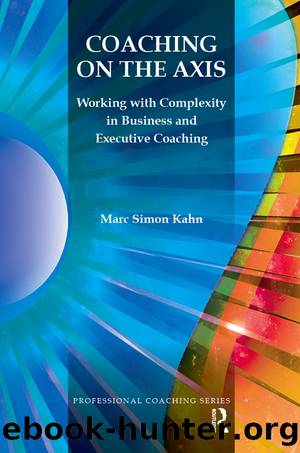Coaching on the Axis by Simon Kahn Marc;

Author:Simon Kahn, Marc;
Language: eng
Format: epub
Publisher: Taylor & Francis Group
Business coaching at the existential level
During coaching, people may find themselves exploring existential concernsâthe search for meaning in existence (Blackburn, 2005). The philosophical works of Martin Heidegger (1962) and others such as Victor Frankl (1984) and Ernesto Spinelli (1989) inform this aspect of coaching work. These authors tackle the fabric of meaning that human beings create in the narrative of their lives. What does it mean to âbeâ the person one is? Such considerations are âdeeply rootedâ because they reach into the search for answers to the primordial questions: âWho am I? Why do I exist?â
In business coaching, âthe coach helps the client to articulate existential concerns such as freedom, purpose, choice and anxiety, and identify and replace limiting paradigms, thus leading to positive changeâ (Stout-Rostron, 2009, p. 234). This level of work can be important, especially when it influences the relationship between the individual and his or her organisation. What role does oneâs work play in the meaning-making narrative of oneâs life? Exploring individual meaning and purpose is a powerful entry into deeper layers of relating between a person, an organisation, and the underlying beliefs and meaning structures of the two.
Existential dialogues in business coaching can occur when an individual questions his or her own personal values and core beliefs in relation to those of the organisation, and can go so far as to touch on issues of morality, spirituality and faith. They also emerge when a coach prompts the client to examine why he or she holds particular views of the world. This often happens as part of the process of understanding what is happening in a business context around a particular choice or action.
For example, Bianca, a creative director in an advertising agency, held the belief that humans should not eat animals as âthe practice of killing living beings is wrong.â She appreciated that in the animal world many killed for survival, but maintained that human beings could survive without doing this and âthe practice supported an ideology of aggression in the world.â It was this ideology that she felt was problematic in that it underpinned many forms of suffering, both for people and the planet. As a result she was a strict vegetarian.
One day, during a coaching process focused on building Biancaâs leadership abilities, she arrived at her session in a state of existential anxiety. She had been asked to lead a marketing campaign for a large fast food chicken chain. She explained that she was unable to work on this account because of her âvalues and beliefs.â Unfortunately, the account featured as a major opportunity for her company who were thrilled to have won the work, and expected her to deliver her usual creative genius. âI just donât know what to do, Iâm completely stuck?â she said in her coaching session. In this situation, the existential concerns of the individual were in conflict with those of the environment to the extent that the success of both, from a business point of view, was at stake.
Download
This site does not store any files on its server. We only index and link to content provided by other sites. Please contact the content providers to delete copyright contents if any and email us, we'll remove relevant links or contents immediately.
Rewire Your Anxious Brain by Catherine M. Pittman(18654)
Talking to Strangers by Malcolm Gladwell(13370)
The Art of Thinking Clearly by Rolf Dobelli(10489)
Mindhunter: Inside the FBI's Elite Serial Crime Unit by John E. Douglas & Mark Olshaker(9343)
Becoming Supernatural by Dr. Joe Dispenza(8217)
Change Your Questions, Change Your Life by Marilee Adams(7781)
Nudge - Improving Decisions about Health, Wealth, and Happiness by Thaler Sunstein(7706)
The Road Less Traveled by M. Scott Peck(7603)
The Lost Art of Listening by Michael P. Nichols(7506)
Mastermind: How to Think Like Sherlock Holmes by Maria Konnikova(7347)
Enlightenment Now: The Case for Reason, Science, Humanism, and Progress by Steven Pinker(7313)
Win Bigly by Scott Adams(7198)
The Way of Zen by Alan W. Watts(6614)
Daring Greatly by Brene Brown(6513)
Big Magic: Creative Living Beyond Fear by Elizabeth Gilbert(5771)
Grit by Angela Duckworth(5614)
Ego Is the Enemy by Ryan Holiday(5448)
Men In Love by Nancy Friday(5240)
The Laws of Human Nature by Robert Greene(5208)
